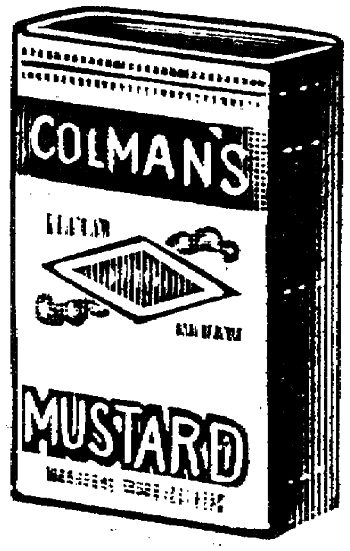A Seventeenth Century Mustard Sauce
This sauce complements just about any meat--or fish. The editor’s version is based on one from Giving Thanks, the excellent essay and cookbook on Thanksgiving from Plimoth Plantation, which, in turn, is based on a recipe in Sir Kenelme Digby’s publication from 1669, The Knight’s Closet Opened.
 -½ cup mustard powder (Colman’s is recommended)
-½ cup mustard powder (Colman’s is recommended)
-1 Tablespoon Demerara or brown sugar
-1 teaspoon ground ginger
-scant teaspoon salt
-½ teaspoon white pepper
-1 Tablespoon Sherry
-½ to ¾ cup malt or cider vinegar
- Mix the dry ingredients together in a jar big enough to hold them and the liquids.
- Add the sherry and vinegar to the jar, cap it, and shake it with extreme violence to create a suspension.
Notes:
- As noted in Giving Thanks, the sauce “can be eaten at this point; however, it will be very sharp. The mustard mellows nicely over time and is at its best at least a week or two after it is made. Kathleen Curtin & Sandra L. Oliver, Giving Thanks: Thanksgiving Recipes and History, from Pilgrims to Pumpkin Pie (New york 2005) 144-45
- The recipe in Giving Thanks uses a considerably higher proportion of vinegar to mustard; we found that the formula produced an extremely ‘watery’ sauce. Curiously, however, the Plimoth book recommends thinning the recipe with water or other liquids if it is too thick.
- Mustard is one of the oldest flavorings in the English cupboard and remains ubiquitous on English tables. As Giving Thanks explains, “[m]ustard was without a doubt the most common condiment in the seventeenth century. It was served with every sort of meat and was thought to be especially good with goose, brawn (pickled pork), and fish.” (Giving Thanks 144).
- The native Americans did not like it: They “misliked nothing but our mustard, whereat they made many a sowre face.” (Bartholomew Gosnard writing in 1602, quoted in Giving Thanks 144)
- Of course, brawn is not pickled pork, but rather what Americans call head cheese. Mustard is good with brawn too.

